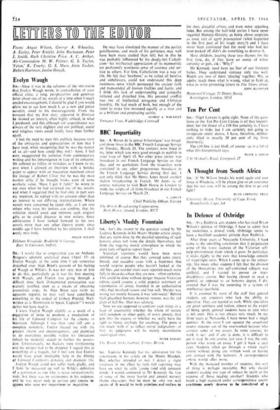Snt,—I would like to congratulate you on Anthony Burgess's splendid
analytical piece (April 15) on Evelyn Waugh; at the same time 1 am somewhat disturbed over Alan Brien's account of his baiting of Waugh at White's. It was not very nice of him to do this, particularly as it was his first meeting with Waugh, and Evelyn was going through a difficult time. Such ill-mannered provocation was scarcely justified, even as a means of obtaining journalistic copy. As Alan Brien says (with no apparent regrets), he may well have contributed something to the ordeal of Gilbert Pinfold. Well- written as is Permission to Speak. Captain?) I would rather not have read it.
knew Evelyn Waugh slightly as a result of a --suggestion of mine to promote a production of Isis life of Edmund Campion for the cinema or -television. Although I was then (and still amt a -complete nonentity. Evelyn treated me with the greatest charm and encouragement, and promised to do everything possible within his limitations (which he modestly stated) to further the promo- tion. Unfortunately. no backers were forthcoming and the project had to be dropped. I regard this as something of a tragedy, for I feel sure that Evelyn would have given invaluable help in the filming of Edmund Campion's dynantiii and dramatic life. Evelyn Waugh could not sutler fools gladly, and I think he measured up well to Wilde's definition of a gentleman as one who is never unintentionally rude; but there was no viciousness in his rudeness. and be was never rude to serious and sincere in- quirers who were not impertinent or inquisitive. He may have simulated the manner of the parfait gentilhomme, and much of his politeness may well have been more studied than felt; but in this he was probably influenced by his deeply-felt Catholi- cism—his intellectual appreciation of its manneristic yet profoundly numinous sense of courtesy and ser- vice to others. For him, Catholicism was a way of life. He felt that 'heathens,' as he called all heretics and unbelievers, could not understand this deep numinous sense which permeated the ancient faith and transcended all human frailties and faults; and I think this lack of understanding and sympathy irritated and disturbed him. His personal conflict was one of intellectual, arrogance and Christian humility. He had much of both, but enough of the latter to make him mourned equally as a man and as a brilliant and penetrating satirist.
GEORGE A. WHFATLEY
Trenance Lean, Wadebridge, Cornwall










































 Previous page
Previous page